Testing on Animals

This thought-provoking topic explores the ethical, scientific and societal dimensions of animal testing. Engaging in discussions about its pros and cons, learners develop critical thinking skills and broaden their vocabulary. Analysing diverse viewpoints nurtures persuasive language abilities and fosters respectful debates.
By discussing this complex issue, English learners gain insights into global concerns and learn to express their opinions effectively. Embracing this topic empowers learners to discuss animal welfare, scientific advancements and ethical considerations with confidence and cultural awareness.
Testing on Animals Review
Although animal testing is commonplace in today’s society, there is an increasing amount of people who are actively looking to buy products that are not tested on animals as well as campaigning for the banning of all animal testing.
While most would agree that the suffering that the animals go through in the testing process is not ideal, it is often considered an unfortunate side effect in order to produce products that are safe for human use. Others argue that an animal’s life is just as important as a human’s and you can’t spare one to save another.
Useful Vocabulary
Try and use the following vocabulary when answering the question. Click to look up the definition in the dictionary
Conversation Questions
- What is your opinion on testing products and medicines on animals? Do you think it is necessary?
- Do you check if products have been tested on animals before buying them?
- What are some potential benefits and drawbacks of testing on animals for scientific research and medical advancements?
- Is animal testing an effective and reliable method for predicting human reactions to products and medications?
- Are there any specific animals that should not be used in testing? Why do you feel that way?
- Are there any circumstances where animal testing is justified, such as in life-saving medical research?
- Do you think animal testing should be allowed for cosmetic products?
- Why do you think some people are completely against any kind of animal testing?
- Should animal testing be completely banned worldwide?
- What would the negative effect be if animal testing was banned?
- Are there any alternatives to animal testing that could be more ethical and effective?

